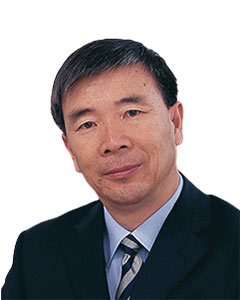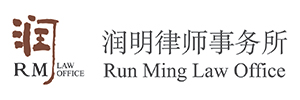A trademark is used to distinguish between producers of goods or providers of commercial services. A personal name is an appellation that has an intimate connection with a natural person, and has legal meaning.
Although “trademark” and “personal name” are different legal concepts, personal names are one of the things from which trademarks can be created. The use of the names of people with a certain degree of fame as trademarks is commonly seen.
The link that has thus been established between trademarks and personal names has given rise to the possibility that a person’s name may be infringed by the registration of a trademark.
Two methods of protection

Executive Partner
Run Ming Law Office
The right to one’s name is a personal, private right. In administrative procedures relating to the granting and confirmation of trademark rights, the trademark authorities may provide protection over rights to personal names either of their own accord or upon application.
The former involves rejection by the trademark authorities of applications by third parties to register trademarks that are identical or similar to the names of persons well known in politics, or on the international stage, or the names of artists who are particularly well known in fields such as literature and the arts, and the names of people who have made exceptional contributions to sports, science and technology and other such fields without the authorization of the person whose name is being used. The rejection of such applications takes place under item 8 of the first paragraph of article 10 of the PRC Trademark Law.
Protection in this manner by the trademark authorities is mainly geared to safeguarding the public interest, rather than individual rights. However, the judgement as to whether the registration of a well-known person’s name as a trademark will harm the public interest may depend largely on the examiner’s personal knowledge. For this reason, there are numerous instances where the registration of a trademark that conflicts with a famous person’s right to his or her name is granted.
Consequently, it may be necessary for the rights holder him or herself to apply for protection upon application. Protection upon application means that the rights holder seeks to protect the right to his or her own name by instituting a trademark opposition, trademark dispute, cancellation or other such procedure.
Trademark hearing standards

Intellectual Property
Adviser
Run Ming Law Office
Based on the trademark hearing standards published by the Trademark Review and Adjudication Board, when an administrative authority hears such a case relating to the right to a person’s name, it must consider 1) whether the disputed trademark is identical to the name of the well-known person; 2) whether the person concerned was well-known before the application for the disputed trademark; and 3) whether the goods or services for which the trademark is designated have a close connection with the field in which the public figure became well-known, and whether the trademark would cause confusion among relevant consumers and thus harm the interests or reputation of the rights holder.
If all of these criteria are satisfied, the trademark authority will support the claims of the rights holder. However, in cases where a trademark was used in good faith, is coincidentally identical to the name of a public figure and was in use before the relevant person became well known to the public, it will not be held to constitute infringement.
For example, in the Wang Nan trademark opposition case, there are many people called Wang Nan in China, but the trademark applicant applied for the Wang Nan trademark for goods such as sports equipment, and sportswear. These goods happen to be closely connected with the sports in which the famous table tennis player, Wang Nan, is involved in, increasing the likelihood of public confusion. The Trademark Office upheld the sportsman, Wang Nan’s, claims in this case.
Special issues raised
There are also some special aspects to the protection of person’s right to his or her name. If the words in a trademark do not include the surname, but only words that are identical to the given name of a well-known person, can it be held to be an infringement of the person’s right to his or her name? For example, in the Yundi trademark dispute case, the trademark was designated for use for goods in Class 15, musical instruments. The world famous pianist, Mr Li Yundi, requested that the Yundi registered trademark be cancelled on the grounds that it infringed on his right to his name.
A search on the Trademark Office’s website shows that there have been 10 cases involving the characters Yundi as a trademark, and Li initiated a claim only against the Yundi trademark registered in Class 15. The case involved several salient points:
- the application for the trademark was made after Li had won a major international prize and become well known to the average consumer in China;
- the goods for which the Yundi trademark was designated have a close connection with the performance art in which Li is involved;
- Yundi is not a common character combination and contains characters that are not traditionally used in Chinese names, and is therefore distinctive; and
- the use of the trademark for specific goods such as musical instruments has a relatively strong degree of indicativeness.
Greater protection needed
We are of the opinion that, in this case, the trademark applicant’s deliberate subjective intent to benefit from Li Yundi’s reputation is quite obvious. The registration and use of this trademark would be likely to give rise to an association in the average consumer’s mind, thereby resulting in the mistaken belief that there was a connection between the relevant goods and Li, thereby causing damage to his economic interests and reputation.
Accordingly, we feel that, in such special cases, the trademark authorities should consider going beyond the standards of past hearings and accord rights holders greater protection.
Wang Yadong is executive partner of Run Ming Law Office
Liu Hezhen, formerly head of the 7th department of the Trademark Office, is an intellectual property adviser at Run Ming Law Office

12A Jianguomenwai Avenue,
Chaoyang District, Beijing, China
Postal code: 100022
Tel: +8610 65693511
Fax: +8610 65693512/13
www.runminglaw.com
E-mail:
wangyd@runminglaw.com
liuhz@runminglaw.com





















